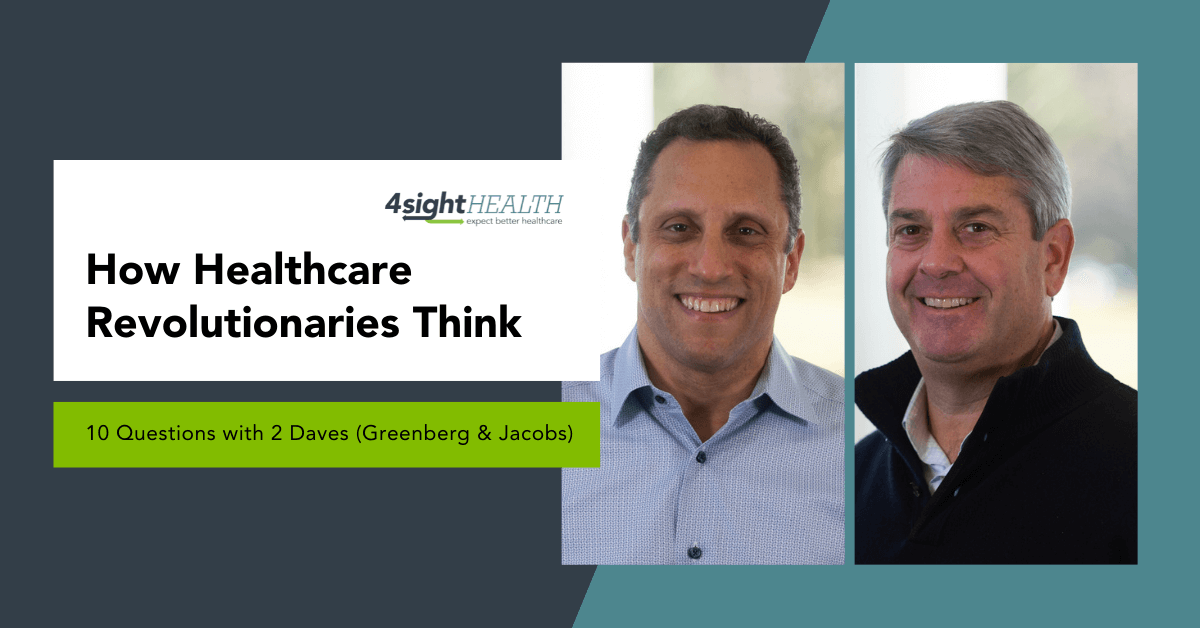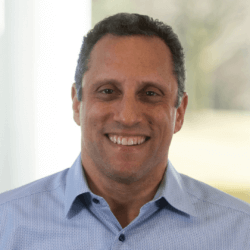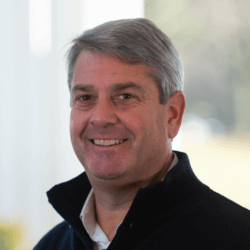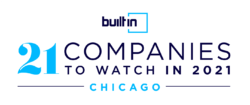September 9, 2021

How Healthcare Revolutionaries Think: 10 Questions with 2 Daves (Greenberg & Jacobs)
Welcome to the latest installment of 4sight Health’s monthly series, How Healthcare Revolutionaries Think. Our interview series profiles healthcare instigators who believe that outcomes matter, customers count and value rules.
Over the course of the series, we’ve talked to outsiders, insiders and lone wolves. But we’ve not talked to co-conspirators. That is, until now. The co-conspirators are David Greenberg and Dave Jacobs, the co-founders and co-CEOs of Homethrive.
The two former Medline senior executives founded Homethrive in 2017. The Northbrook, Ill.-based company uses technology and 1-1 advice to help caregivers navigate the complicated path of arranging the best care for aging or special-needs loved ones.
Co-founders. Co-CEOs. Same first names. How do they keep things straight and make it work as they try to revolutionize family caregiving? We asked them all about it in this interview.
1. I’m not sure who wants to go first, but how do you define a healthcare revolutionary?
Greenberg: I promise you we didn’t compare notes on all this, so we’re just going to do this on the fly. I think a healthcare revolutionary is someone who starts with a fresh perspective and isn’t saddled with customary thinking or the status quo when considering the job to be done. I’m a big believer in sitting in a room with an empty whiteboard or blank sheet of paper and starting from zero, unburdened by things we’ve inherited. If you start without those encumbrances, you’re bound to generate more thoughtful, progressive and creative ideas.
Jacobs: I’d add that it’s someone who is willing and able to challenge traditional orthodoxy of the current standards and what has to be true. If you’re going to challenge healthcare quality or access or costs, you have to take on a lot of fundamental assumptions. Revolutionaries also must have the ability to see a true unmet need and create a market to fill that need. I know that sounds obvious, but a lot of people start, and stop, with what they think is a good idea and think things will work out from there.
2. Who in healthcare today fits your collective definition of a healthcare revolutionary?

Greenberg: I’ve been impressed with the push to bring more medical care into the home, whether that’s traditional post-acute care or now primary care. When I think of that, I think of Glen Tullman, who we’ve been fortunate to know and who sits on our board of directors. Glen founded Livongo, which is now part of Teledoc, and now he’s the CEO of Transcarent. At each stop Glen’s trying to solve a problem in a new way and, by doing so, take on and undo years of what we thought was the only way to do something.
Jacobs: For me the person who comes to mind is Rick Krieger who started MinuteClinic (originally known as QuickMedx) in 1999. Years ago, my son had an ear infection. It was nine at night. And we thought our only option was the emergency room until my wife suggested we take him down to the MinuteClinic. It was convenient. It was effective. It was the right amount of care for the symptoms. They were able to triage and treat his ear infection right away. Rick broke the traditional orthodoxy of “you have to go to the doctor or to the hospital.” That was revolutionary. That really was a paradigm-breaking moment.
3. Some revolutionaries go it alone. Others have a partner in crime, so to speak. What’s easier to do? Changing things yourself? Or changing things with a partner?
Greenberg: I’d respectfully debate this until I got laryngitis. How anyone can suggest that going it alone produces a better outcome is wrong. Without a doubt, two heads are better than one.
Jacobs: I feel the same way. I don’t think any revolution or any organization can be successful with one person leading the charge. It’s not just about collaboration or getting more work done. It’s also about pushing each other. It’s about constructive criticism. It’s about challenging an idea. You’ll get to where you need to go faster by having a partner.
4. How does that work with you two? You both left big positions at Medline to start Homethrive together as co-everything. What’s your secret to a successful partnership?
Greenberg: We did work together at Medline. We did leave together. And we are best friends. That said, we’ve created some internal processes to avoid some landmines that doom other co-CEO arrangements in healthcare and other industries. We’ve made thousands and thousands of decisions, and I can count on one hand the times we’ve disagreed and both felt strongly about our positions. When that happens, we bring the debate to our management team and discuss the situation in a transparent manner. We resolve it openly in front of everyone. No pre-meetings. No politics. No keeping score. No egos. We get to the right answer quickly and move forward.
Jacobs: One of the founding principles that we believe in and not just say is, we want to get it right, not be right. That leads to better decisions and better outcomes. So, if someone has a better idea or an idea that we can build on, that’s the most important thing. You’ve got to put your ego aside. On-the-other-hand, there is a built-in redundancy because we trust each other and trust each other’s judgment. If one of us goes on vacation or is too busy with other things, the other can make the decision. We don’t wait for a consensus, and everything doesn’t have to be a 2-0 vote. We just move and move fast.
5. Dave Jacobs, you came from the post-acute care division of Medline. How does that experience manifest itself at Homethrive?
Jacobs: I ran the post-acute business there, and I literally was in and out of hundreds of post-acute care facilities like senior living, nursing homes, home health and hospice. Frankly, I thought I understood the business as well as anyone, and I probably did from that vantage point. But that changed when my dad got sick a few years back, and he needed home care. I thought my healthcare experience, the fact that we have a close family and that we have the means to support my parents would be big assets. I found that despite those advantages, I didn’t have nearly the skills or experience needed to cope with an aging or sick loved one who wants to be at home. If we couldn’t navigate all of the challenges, how can others without those advantages? It compelled me to work with David, leave our cushy jobs and try to effect change in this area in a way that no one else was doing.
6. David Greenberg, you came from the hospital supply division of Medline. How does that experience manifest itself at Homethrive?
Greenberg: My experience dovetails with Dave’s. It’s impossible to hang around hospitals and not see how unprepared many families are when a family member is discharged from the hospital. They’re sons, daughters, siblings, spouses, and they are ill-prepared for what’s next. They don’t know what questions to ask. They don’t know what products they need. They don’t know what services are available. Hospital discharge planners do a good job. But after the patient leaves to go home, all these family caregivers are pretty much on their own. Our mission is to support those family members.
7. It’s not like these home care jobs to be done magically appeared to you the day you left Medline. You knew this stuff was happening. What can you do as entrepreneurs at a small company that you couldn’t do as senior executives at a large company?

Jacobs: Large companies, Medline included, move slowly. They need alignment between a lot of layers. They do things incrementally. You need large numbers to move the needle quickly because that’s the way incentives are set up. Protecting the existing business is one of the most important things that you can do. All of this conspires against you to prevent you from pursuing real, entrepreneurial, innovative opportunities. We wanted to start with a fresh slate and not be burdened by all the responsibilities of managing a large organization. That lets us focus on the real problem and build solutions quickly from a customer’s point of view.
Greenberg: What Dave said is completely correct. What we lack in size we make up in speed and agility. It’s also easier to be innovative when you’re closer to the customer. Being smaller and nimbler, you talk to customers, you talk to members, you understand their issues and problems. It allows you to evolve and pivot more quickly to address whatever concerns you hear. You don’t have to go through layers or through this or that or worry about allocation of resources. You just do it. What it takes some companies weeks or months to do, we can do in a matter of a day or two.
8. Medline is a big company. It’s been around for a long time. It’s part of the status quo you’re trying to disrupt. At the same time, you collectively worked at Medline for years. Do you feel responsible for creating some of the home care challenges that patients face today?
Greenberg: That’s a fabulous question. I wish it wasn’t quite so fabulous. The business model is a little bit different. At Medline, we were a product distributor and manufacturer. Still, we do share the blame for not innovating faster. We worked in an environment that focused maybe a little too much on short-term financial results and not enough on long-term outcomes.
Jacobs: We certainly were part of the status quo, and Medline, like other companies, serves institutional customers like hospitals and nursing homes more than they do patients directly. They’ve got to support those major customers and hope that that support reaches out to the patients. We recognize that we were part of that. But we take pride in wanting to do something different, to change the status quo. Medline is a good company, and we were doing well. The easy thing would have been to stay.
9. Obviously, culture is very important to both of you. That means people you bring into Homethrive need to fit into that culture. How does that affect your hiring decisions? Any secrets you can share?
Greenberg: While it’s not an employment condition, precedent or prerequisite, I usually ask a candidate whether they’ve gone through this personally. Have they arranged home care for a family member? Did they watch a family member arrange home care for someone else? What was that experience like? You know pretty quickly whether they’re making something up or whether they feel it in their bones. Again, it’s not going to rule anyone out, but we are looking for mission-driven, hardworking, passionate and kind individuals to join our cause.
Jacobs: We have articulated guiding principles that we certainly interview against. But we’re incredibly transparent about it. We share those guiding principles with job candidates, and we push them during the interview process and ask them how they align with those principles. We’re honest about what we want, and there are no surprises. I also think that lets candidates self-select a bit more. It has to be a good fit both ways.
10. OK, last question. Greenberg you go by David, and Jacobs, you go by Dave. Is that deliberate? Why not two Davids or two Daves? Do you do anything else to avoid any confusion?
Greenberg: The David Dave thing is organic. I’ve always been David, and he’s always been Dave. We do sit at opposite sides of the table, so we know who someone’s looking at during a meeting.
Jacobs: I’ve always been Dave because when my dad was upset, he would call me David, and I still have that voice in my head.
Greenberg: I know not to call him David even when something’s up.
Jacobs: He uses other names to get to me.
Burda’s Final Bit
In 1989, I had to arrange home care for my dad who was dying from pancreatic cancer. In 2020, my wife had to arrange home care for her uncle who was dying from congestive heart failure. Even though those events were more than 30 years apart, the experiences were remarkably similar in that we both felt that no one was going out of their way to help us navigate the home care system or coordinate what we had to do. It was up to us to figure it all out. If David and Dave are successful, 30 years from now, arranging home care, and other needed support, will be a positive, frictionless experience. Let’s hope they stay together and get the job done soon.
Read More Healthcare Revolutionary Interviews
- February: Gaurov Dayal, M.D.
- March: Thompson Aderinkomi
- April: Jon Pearce
- May: Kurt Waltenbaugh
- June: Robert Pearl, M.D.
- July: Scott Powder
- August: Jeff Jones
Dave Jacobs — Co-Founder & Co-CEO, Homethrive
 Dave Jacobs has extensive experience as a leader in the healthcare industry. Dave spent fifteen years as a senior executive at Medline Industries – as President of the Durable Medical Equipment division and running Medline’s Post-Acute. While in those roles, Dave developed a deep, first-hand appreciation for the benefits of seniors living independently at home and the many challenges seniors and their family caregivers face.
Dave Jacobs has extensive experience as a leader in the healthcare industry. Dave spent fifteen years as a senior executive at Medline Industries – as President of the Durable Medical Equipment division and running Medline’s Post-Acute. While in those roles, Dave developed a deep, first-hand appreciation for the benefits of seniors living independently at home and the many challenges seniors and their family caregivers face.

Prior to that, Dave co-founded a technology company that quickly soared to the 77th spot on the Inc. Magazine’s Fastest Growing Private Companies list. Dave’s varied professional background also includes a position with a private equity company, and an executive level marketing role with the Quaker Oats Company. He currently holds a position on the Board of Directors of a $500m privately held consumer products company.
Dave takes great pride in balancing his work with his busy family life. He lives in Highland Park, IL with his wife and two children. He earned a BA from Yale University and an MBA from The Kellogg School of Management at Northwestern University.
David Greenberg — Co-Founder & Co-CEO, Homethrive
 As a veteran executive, David has enjoyed a distinguished career rooted in leading multi-billion dollar companies. Prior to co-founding Homethrive, David served as Executive Vice President of Strategy and Group President at Medline Industries, where he defined and supported strategic priorities, business development initiatives to strengthen the portfolio, and M&A.
As a veteran executive, David has enjoyed a distinguished career rooted in leading multi-billion dollar companies. Prior to co-founding Homethrive, David served as Executive Vice President of Strategy and Group President at Medline Industries, where he defined and supported strategic priorities, business development initiatives to strengthen the portfolio, and M&A.

Prior to his time at Medline, David also held several senior leadership positions at Aon Corporation which included serving as the CFO of a multibillion-dollar business unit, CEO of a $1B+ Auto Finance division, and managing AON’s ~$2B Private Equity Portfolio. David previously worked as a Corporate Attorney in Chicago, IL. Currently, David holds the position of Lead Director of ICU Medical, a medical device manufacturing company (ICUI: $5B market cap).
David continues his involvement with several charitable organizations and lives in the Chicago suburbs with his wife and three daughters. He earned a BA from the University of Illinois, Urbana Champaign and a JD from the Chicago-Kent College of Law at the Illinois Institute of Technology.





